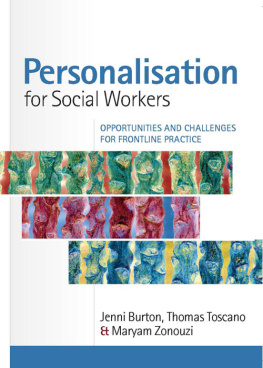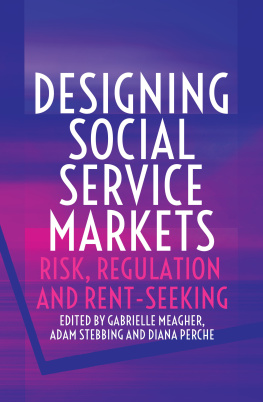POLICY AND PRACTICE IN HEALTH AND SOCIAL CARE
SERIES EDITORS
ALISON PETCH and CHARLOTTE PEARSON
Self-directed Support: Personalisation, Choice and Control
Charlotte Pearson
Lecturer in Social & Public Policy,
Institute of Health & Well-Being,
University of Glasgow
Julie Ridley
Reader in Applied Social Science,
University of Central Lancashire
and
Susan Hunter
Honorary Fellow, School of Social and Political Science, University of Edinburgh
CONTENTS
SERIES EDITORS INTRODUCTION
Some time ago, Charlotte Pearson produced the second volume in this series. With Personalisation in the title, that book has attracted renewed interest in recent years as the term became increasingly familiar as a shorthand for a person-centred approach, an emphasis on the individual and on choice. We approached the author and asked if she would like to prepare an updated edition. She responded with a more exciting suggestion a new volume that would focus on self-directed support (SDS) and would draw in addition on the expertise of two co-authors. Although SDS is just one element of a wider personalisation agenda, the prospective implementation of new legislation in Scotland from April 2014 made this a particularly attractive proposition.
provides a very interesting reflection on the potential impact of SDS on professional roles; if SDS achieves its full potential, the role of professional support is likely to be very different. The final chapter considers the extent to which the aspirations for choice and control inherent in a more personalised delivery can be achieved in a period of austerity or whether they are inevitably compromised.
A key strength of this volume is that it gets beyond the immediate concerns of SDS implementation, the who, what, when, and the specifics of the four options that are preoccupying the workforce in the immediate aftermath of the legislation. It reminds us of the broader principles that underlie the concept and the aspirations of those who first argued for the approach. It offers an important benchmark for ongoing critical appraisal of both the policy and the practice of SDS in particular and personalisation more broadly.
It is a particular pleasure that publication of this book marks Charlotte Pearsons new role as a series editor for Policy and Practice in Health and Social Care, in succession to Joyce Cavaye, whose sterling work as a founding editor has helped establish the series place in the literature scrutinising the health and social care issues of a modern democratic state and the Scottish response to the challenges faced
Professor Alison Petch
The Institute for Research and Innovation in Social Services (IRISS), Glasgow
LIST OF ABBREVIATIONS
| ADASS | Association of Directors of Adult Social Services |
| ADSW | Association of Directors of Social Work |
| ASPA | Adult Support and Protection Act 20007 |
| CIL | Centres for Independent/Inclusive Living |
| COSLA | Convention of Scottish Local Authorities |
| CRPD | Convention on the Rights of Persons with Disabilities |
| DLA | Disability Living Allowance |
| DP | Direct payment |
| DPAC | Disabled People Against the Cuts |
| ENIL | European Network on Independent Living |
| IB | Individual Budget |
| IBSEN | Individual Budgets Evaluation Network |
| ILF | Independent Living Fund |
| ILT | Independent Living Transfer |
| IRISS | Innovation in Social Services |
| NPG | New Public Governance |
| NPM | New Public Management |
| PA | Personal assistant |
| PB | Personal budget |
| PIP | Personal Independence Payment |
| RAS | Resource allocation system |
| SDS | Self-directed Support |
| SDSS | Self-directed Support Scotland |
| SNP | Scottish Nationalist Party |
| SPAEN | Scottish Personal Assistants Employers Network |
CHAPTER 1
Introduction
Over the past thirty years, there has been a gradual shift in social care provision towards an increasingly personalised framework of support, whereby individual users are more involved in the choice of services they are assessed as needing. They can have the option of purchasing these through a cash payment, which is paid directly to them (Arksey and Kemp, 2008). With new legislation for selfdirected support (SDS) implemented in Scotland in April 2014, social care has entered a new era, heralding a major cultural shift for both users and service professionals. By drawing on a range of literature and empirical findings that have underpinned the emergence of policies in Scotland, the UK and across Europe, this book sets out to unravel some of the key debates. In doing this, it will set out the framework to explore the conceptual changes, the renegotiation of professional roles and the impact on users, particularly as legislation emerges at a time of economic downturn.
Before setting out these ideas in more detail, however, it is important to recognise the origins of policy development and establish the backdrop of disability activism, which initiated these changes. We therefore begin by outlining how a campaign by a small number of disabled people informed a long-term global shift in the reorganisation and delivery of social care services. Discussion then moves to explore how direct payments (DP) policy emerged on the statute and yet led to only marginal use across the UK, especially in Scotland. Despite acknowledging the importance of an increasingly individualised model of social care, the implementation of DP policy has waned in the past decade, and successive central and local governments north and south of the border have embraced a new focus on personalisation. In looking at some of the broader themes through which policy emerged, this chapter concludes by detailing an outline of the book and a summary of the terms that will be used.
The campaign for personalised support: The role of disability activism
The idea of cash-for-care-based support schemes as an alternative to directly organised services originated in the 1970s in the US (Arksey and Kemp, 2008). At this time, a small group of students with physical impairments at the University of Berkeley secured the payment of cash in place of services to buy in support that fitted with their daily needs on campus. Gradually, news of this spread throughout the US, and by the 1980s similar challenges were being made by groups of disabled people in the UK (Campbell and Oliver, 1996).
As described in Pearson (2006), throughout the 1980s and 1990s indirect payments those administered through third parties such as voluntary sector organisations or independent local trusts were used to overcome legal restrictions to a cash-based model of support across the UK. Prior to this time, the 1948 Social Security Act covering England and Wales had stipulated that only services not payments could be made by local authorities, while the position differed slightly in Scotland. Provisions set out in Section 12 of the 1968 Social Work (Scotland) Act allowed cash payments to be made available by local authorities in exceptional circumstances (Roll, 1996). However, the impact of this ruling was limited, as there was only minimal knowledge of this guidance among local authority practitioners (Pearson, 2000), and evidence of only one area making payments through this route (Witcher et al., 2000).









